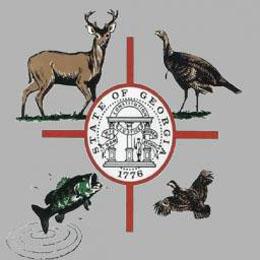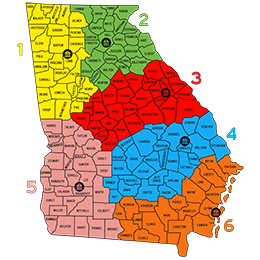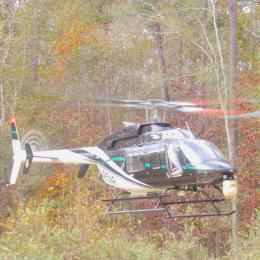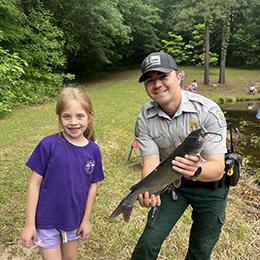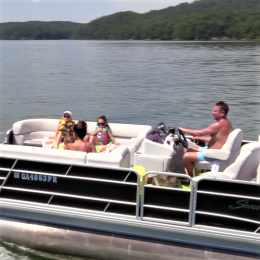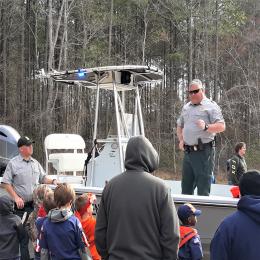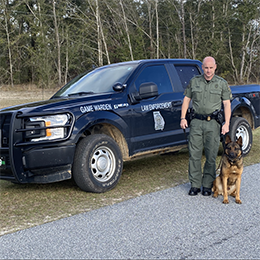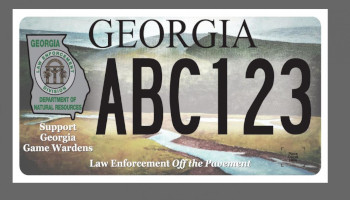Tilapia are becoming increasingly popular as a food fish species and they are often considered for use as part of aquaculture demonstration projects. Despite the growing popularity of tilapia, and the widespread availability of fish, there are some specific legal requirements related to keeping, raising, and selling tilapia that prospective culturists and educators should be aware of.
Under the Georgia Law (O.C.G.A. 27-5-5) pertaining to the Wild Animal Licenses requirements for fish, tilapia are considered an exotic fish species. Tilapia, and certain other exotic fish species*, may be raised and held in aquaria or tanks under certain conditions without needing to obtain any special licenses or permits. Selling tilapia will always require a license from DNR. The type of license required depends on how the fish are held (see below).
*Certain fish species always require a DNR-issued Wild Animal License, and may require liability insurance, regardless of how they are held. Tilapia are not one of those species. Included fish may be found on this list - Exotic Animals List.
Below is some information that will help you decide what licenses and permits may be required for culturing tilapia. Please consult this information before you begin a project or obtain fish. For technical assistance with aquaculture production, fish culture, or ponds, please contact the appropriate District or Regional Fisheries Management office that handles the county in which your business operation, school, or pond is located. Click here to find the appropriate office (choose "Fisheries Management" for the office search).
Can tilapia be stocked into ponds and lakes in Georgia?
Tilapia may not be stocked into ponds or lakes. This includes stocking for the purpose of raising them as a cultured species or for use as a forage species for other fish (i.e. supplemental feeding of trophy largemouth bass).
When would holding or raising tilapia REQUIRE a conditioned Wild Animal License (WAL) from DNR?
Under Georgia law (O.C.G.A. 27-5-5(b)(6)), all exotic fish which are not held in aquaria or tanks under certain conditions require a WAL. If tilapia are held or raised in a manner that does NOT meet all of the following conditions, a WAL would be required. Conditions that must minimally be met:
Tilapia must be held in tanks or aquaria, which are defined as "containers for holding fish from which no water is discharged except during periodic cleaning", and;
Water discharged during periodic cleaning must be handled and disposed of in a specific manner -" discharged water is passed through a filtering system capable of removing all fish and fish eggs and is disposed of ONLY in a septic tank permitted by the county or in a waste-water treatment system permitted by the Environmental Protection Division of the department [DNR]".
If your project or operation doesn't minimally meet the requirements listed above in numbers 1 and 2, then you need to contact DNR to find out about obtaining a Wild Animal License for tilapia.
The full wording of the "tank and aquaria exclusion" of the Wild Animal Act may also be found at O.C.G.A. 27-5-5(b)(6).
What are some examples of situations where conditions of the "tank and aquaria exclusion" ARE met (and a WAL would NOT be required)?
Tilapia are held in tanks or aquaria in an enclosed building, classroom or greenhouse and ALL water generated during periodic tank cleaning is filtered to remove all fish and eggs and the water is discharged only into an approved septic tank or waste-water system (i.e. water is filtered and goes down the sink or into the sewer system)
Tilapia are held and hauled in a hauling tank or truck from which no water is discharged (i.e. fish are netted out of tank or truck and placed in appropriate tanks or aquaria at their destination. At the conclusion of hauling activities, the hauling tank gets cleaned and the water eventually gets properly filtered and goes only into an approved septic tank or waste-water system).
What are some examples of specific situations where all conditions of the "tank and aquaria exclusion" would NOT be met (and a WAL WOULD be required)?
The following is not all-inclusive, but rather provides some examples of specific situations that may arise.
Tilapia are to be held in cages in a pond or in raceways where water is discharged in the course of culture activities (or where the raceways are not contained or secure)
Tilapia are held in tanks or aquaria where the water from periodic cleaning is to be discharged and disposed of somewhere other than in an approved septic tank or waste-water system (i.e. water will be used for hydroponics or applied to crops)
Tilapia are held and/or hauled in tanks or on a hauling truck and the hauling water is not discharged into an approved septic tank or waste-water system (i.e. water is to be dumped onto the ground, in a field, or other area)
If a conditioned WAL is required for a tilapia project or operation, what types of conditions may be generally required?
(Note: although all WALs are individually conditioned, the following examples show what may be required).
The tanks and culture facility should be situated outside of the 100-year floodplain.
The building or facility housing the tilapia should be secure and access should be able to be controlled (i.e. doors that can be locked, barriers or screens to prevent birds and predators from accessing fish/tanks).
Tilapia should not be housed in the same tank or in the same culture system as other fish species that may be stocked into ponds or lakes, or offered for sale to be stocked into ponds or lakes. This prevents the unintentional spread or transfer of tilapia eggs or juvenile fish to the outside environment.
What DNR licenses are required to legally sell tilapia?
If your operation or project requires you to obtain a conditioned Wild Animal License (WAL) from DNR, the WAL will also allow you to sell the species of fish covered by the license. These are annual licenses and must be renewed each year.
If your operation or project can be done under the "tank and aquaria exclusion" of law (as described above) you will need either a Wholesale ($59) or Retail ($10) Fish Dealers license from DNR. These are annual licenses (good April 1 to the following March 31) that are obtained from the DNR License Unit (800-366-2661).
Can tilapia be sold with an Aquaculture Registration?
No. An Aquaculture Registration only covers the culture and sale of domestic fish species (such as channel catfish, largemouth bass, bluegill, rainbow trout, etc.). Click here for information on Aquaculture Registrations and general aquaculture permit requirements.
How do you apply for a Wild Animal License (WAL) from DNR and what fees are involved?
WAL applications are available from the DNR Special Permits Unit 770-918-6408.
WAL fees are $255 annually. Licenses are valid from April 1 to the following March 31 and must be renewed annually.







